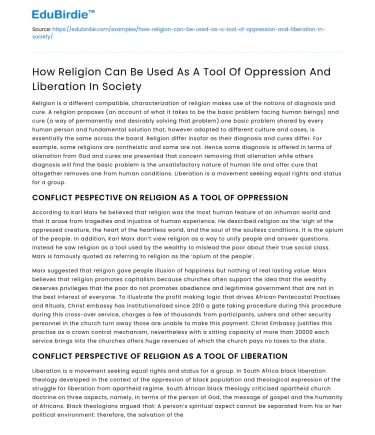Religion is a different compatible, characterization of religion makes use of the notions of diagnosis and cure. A religion proposes (an account of what it takes to be the basic problem facing human beings) and cure (a way of permanently and desirably solving that problem):one basic problem shared by every human person and fundamental solution that, however adopted to different culture and cases, is essentially the same across the board. Religion differ insofar as their diagnosis and cures differ. For example, some religions are nontheistic and some are not. Hence some diagnosis is offered in terms of alienation from God and cures are presented that concern removing that alienation while others diagnosis will find the basic problem is the unsatisfactory nature of human life and offer cure that altogether removes one from human conditions. Liberation is a movement seeking equal rights and status for a group.
CONFLICT PESPECTIVE ON RELIGION AS A TOOL OF OPPRESSION
According to Karl Marx he believed that religion was the most human feature of an inhuman world and that it arose from tragedies and injustice of human experience. He described religion as the ‘sigh of the oppressed creature, the heart of the heartless world, and the soul of the soulless conditions. It is the opium of the people. In addition, Karl Marx don’t view religion as a way to unify people and answer questions. Instead he saw religion as a tool used by the wealthy to mislead the poor about their true social class. Marx is famously quoted as referring to religion as the ‘opium of the people’.
Save your time!
We can take care of your essay
- Proper editing and formatting
- Free revision, title page, and bibliography
- Flexible prices and money-back guarantee
Marx suggested that religion gave people illusion of happiness but nothing of real lasting value. Marx believes that religion promotes capitalism because churches often support the idea that the wealthy deserves privileges that the poor do not promotes obedience and legitimise government that are not in the best interest of everyone. To illustrate the profit making logic that drives African Pentecostal Practises and Rituals, Christ embassy has institutionalized since 2010 a gate taking procedure during this procedure during this cross-over service, charges a fee of thousands from participants, ushers and other security personnel in the church turn away those are unable to make this payment. Christ Embassy justifies this practise as a crown control mechanism, nevertheless with a sitting capacity of more than 20000 each service brings into the churches offers huge revenues of which the church pays no taxes to the state.
CONFLICT PERSPECTIVE OF RELIGION AS A TOOL OF LIBERATION
Liberation is a movement seeking equal rights and status for a group. In South Africa black liberation theology developed in the context of the oppression of black population and theological expression of the struggle for liberation from apartheid regime. South African black theology criticised apartheid church doctrine on three aspects, namely, in terms of the person of God, the message of gospel and the humanity of Africans. Black theologians argued that: A person’s spiritual aspect cannot be separated from his or her political environment: therefore, the salvation of the soul must encompass socio-economic liberation. Consequently, from this perspective, the message of the gospel involves physical as well as spiritual freedom, and immediate as well as eternal benefits. (Mwambazambi,2010, p.7.)
South African black ministers produced a theology that validates ‘African personhood and human dignity’. Archbishop Desmond Tutu affirms that ‘we(Africans) matter, we are alive and kicking, and beautiful’. A unique quality of the Christian liberation struggle in South Africa lay in origins of black churches as missionary sister churches of their white counterparts, and existence of a black majority in the country. In south Africa the black churches were normally part of a large, white-controlled administrative structure. Only later, mostly through the influence of American missionaries, did independent African churches start to flourish. Being dependent upon funding church both doctrine and finances may go part way explaining why south Africa black Christians remained under the spell of apartheid for so long.
Many black Christians saw white Christians as brethren in Christ. Their belief in a fair and just God drove a hope, it seemed, that justice would ultimately prevail. The white people who had introduced Christianity to the natives presented a picture of a God possessing white skin and more often than not, blue eyes. In south Africa the white man had that leading role, and could use it to disseminate a theology presuming white supremacy and determined to maintain the status. Christians who were liberal and white could apologize for inequalities and injustices of apartheid, but criticizing the present system did little to help blacks define themselves.
Black consciousness was a force white liberation theologians had to face, and work with, in order to formulate a liberating praxis Christianity. Religions are real as they genuinely highlight the plight of the masses but fall short by only offering a solution in an afterlife. In line with Karl Marx, Boesak suggested that behind the concerns of liberation theology and the challenges it posed for the Christian Church, are the realities often ignored by the theologies of the western world, these included the realities of rich and poor, of white and black, of oppressor and oppressed, of oppression and liberation from oppression.






 Stuck on your essay?
Stuck on your essay?

